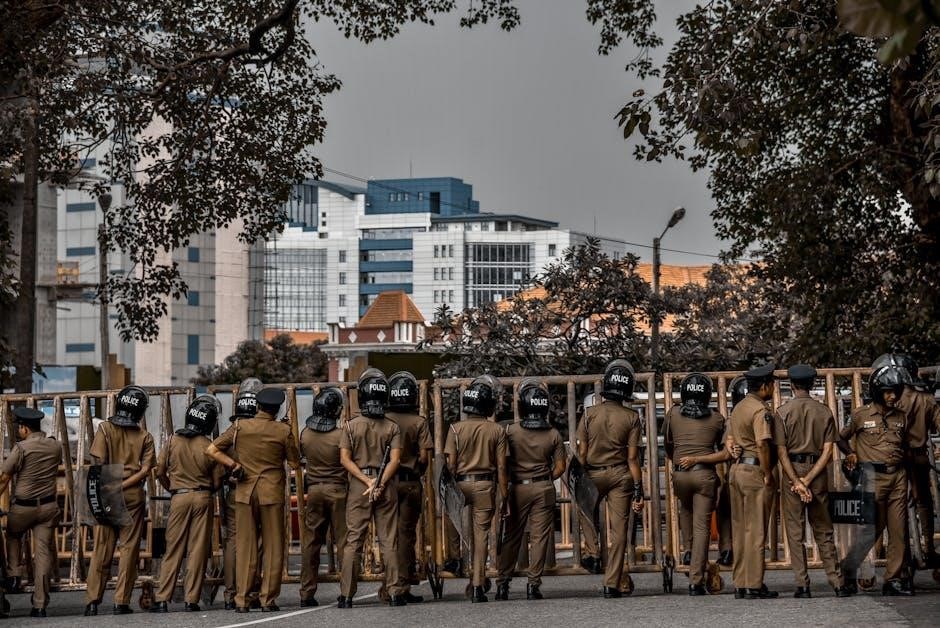security guard exam questions and answers pdf
Security guard exam questions and answers PDFs are essential resources for candidates preparing for certification․ They provide comprehensive guides, practice questions, and study tips to ensure success․
Overview of the Security Guard Exam
The security guard exam is a critical step toward obtaining certification, assessing knowledge of legal protocols, emergency procedures, and security best practices․ It typically includes multiple-choice and scenario-based questions, testing candidates’ ability to handle real-world situations․ The exam format varies by jurisdiction but often covers essential topics like crowd control, surveillance, and conflict resolution․ Effective time management is crucial, as exams are timed and require quick, accurate responses․ Preparation with PDF resources ensures familiarity with exam structure and content, enhancing confidence and readiness for the test․
Importance of Using PDF Resources for Exam Preparation
PDF resources are vital for security guard exam preparation due to their portability, accessibility, and organized structure․ They allow candidates to study anytime, anywhere, using devices like smartphones or tablets․ Many PDF guides include interactive features such as clickable links and fillable forms, enhancing the learning experience․ Additionally, PDFs often contain practice questions and answers, enabling candidates to test their knowledge and identify areas for improvement․ Their cost-effectiveness and environmental benefits make them a preferred choice for modern learners seeking efficient and sustainable study materials․
Understanding the Structure of the Security Guard Exam
The exam assesses knowledge of security protocols, emergency procedures, and legal issues․ It typically includes multiple-choice and scenario-based questions, with a focus on practical application and time management․
Types of Questions Included in the Exam
The security guard exam features multiple-choice questions, true/false statements, and scenario-based queries․ Multiple-choice questions test knowledge on protocols and laws, while true/false statements assess understanding of procedures․ Scenario-based questions evaluate decision-making skills in real-life situations, ensuring practical application of training․ These question types comprehensively cover legal, ethical, and emergency response topics, preparing candidates for diverse challenges in the field․ Effective preparation involves practicing all question types to build confidence and accuracy․ Mastering these formats is crucial for exam success and professional competence․
Time Management and Exam Format
The security guard exam typically includes a set number of questions within a specific time frame, requiring effective time management․ Candidates should allocate equal time to each question, ensuring thorough answers without rushing․ The exam format may vary by jurisdiction but often includes multiple-choice and scenario-based questions․ Practicing with timed mock exams helps build speed and accuracy․ Understanding the exam structure beforehand allows candidates to prioritize questions and manage their time efficiently, increasing chances of success․ Proper time management is key to completing all sections confidently․
Common Security Guard Exam Questions and Topics
The security guard exam covers a variety of topics, including legal and ethical considerations, emergency procedures, and crisis management․ Questions often focus on real-world scenarios, testing practical knowledge and decision-making skills․ Understanding these topics is crucial for effective preparation and ensuring a strong performance on the exam․
Legal and Ethical Considerations in Security Work
Security guards must understand legal and ethical standards to perform their duties responsibly․ Questions in this area focus on use of force, privacy rights, and procedural justice․ Candidates are tested on their ability to make ethical decisions in complex situations, ensuring they adhere to laws and professional conduct․ Understanding these principles is vital for maintaining public trust and avoiding legal consequences․ Proper preparation involves studying real-life scenarios and legal frameworks to apply ethical reasoning effectively during the exam․
Emergency Procedures and Crisis Management
Security guards must master emergency procedures and crisis management to respond effectively in high-pressure situations․ Exam questions cover protocols for fires, medical emergencies, and active threats․ Understanding evacuation routes, communication strategies, and first aid is crucial․ Guards must also know how to assess risks, prioritize safety, and coordinate with emergency services․ Effective crisis management requires staying calm, making quick decisions, and following established protocols to minimize harm and ensure a swift resolution․ Proper training and preparation are essential for handling these critical scenarios confidently and efficiently․

Preparing for the Security Guard Exam
Effective preparation involves studying security protocols, practicing with sample questions, and mastering time management․ Utilize PDF resources for comprehensive study guides and exam strategies to ensure success․
Study Tips and Strategies for Success
Effective study tips include creating a structured study plan, utilizing flashcards for key terms, and regularly reviewing security protocols․ Prioritize understanding legal and ethical considerations, as they are often emphasized․ Dedicate time to practicing scenario-based questions to enhance critical thinking․ Incorporate mock exams to assess readiness and identify weak areas․ Utilize PDF resources for in-depth guides and sample questions, ensuring thorough preparation․ Stay organized, maintain a consistent study routine, and review past exams to build confidence and familiarity with the exam format․
Recommended Resources and Study Materials
Official study guides, online courses, and PDF resources are indispensable for exam preparation․ Utilize security guard training manuals, flashcards, and practice exams to reinforce knowledge․ Websites like Quizlet offer interactive tools for memorizing key terms and concepts․ Advanced search options on Google can help locate specific PDF materials, such as past exam papers and reference books․ Enroll in certified courses or join online forums to access shared study materials․ Prioritize resources that cover legal protocols, emergency procedures, and scenario-based questions to ensure comprehensive preparation․
Security Guard Exam Questions and Answers PDF Resources
Security guard exam questions and answers PDFs are essential study materials․ They include practice questions, answers, and detailed guides to aid in effective exam preparation․
Where to Find Reliable PDF Study Guides
Reliable security guard exam PDF study guides can be found on official exam websites, online marketplaces like Amazon, and educational platforms like Google Books․ Professional associations and training institutes also offer certified materials․ Additionally, websites specializing in exam preparation often provide free or paid downloadable resources․ When selecting a guide, ensure it is updated and aligned with your jurisdiction’s requirements․ Verified reviews and sources can help identify trustworthy materials for effective preparation․
How to Effectively Use PDF Materials for Exam Prep
To effectively use PDF materials for security guard exam prep, create a study schedule and dedicate time to review each section․ Highlight key points and take notes for better retention․ Use flashcards for memorizing terms and concepts․ Practice with mock exams to simulate real test conditions․ Focus on understanding scenarios and legal aspects thoroughly․ Organize your materials by topics and revisit challenging areas․ Utilize advanced search functions within PDFs to quickly locate specific information․ Regularly review and update your study notes to stay prepared and confident for the exam․

Practice Questions and Mock Exams
Practice questions and mock exams enhance preparation by improving understanding, testing knowledge, and building confidence․ They familiarize candidates with exam formats and refine test-taking skills effectively․
Sample Questions to Test Your Knowledge
Sample questions are crucial for assessing readiness and understanding of key security concepts․ They include multiple-choice and scenario-based queries, covering legal protocols, emergency procedures, and more․ Examples like, “What steps should a security guard take during a fire evacuation?” or “How would you handle a suspicious individual?” help evaluate practical knowledge․ These questions mirror actual exam content, allowing candidates to identify gaps in their understanding and focus on areas needing improvement․ Regularly practicing these samples enhances confidence and ensures familiarity with the exam format and timing․ They also aid in refining test-taking strategies and time management skills, which are vital for success․ By reviewing answers and explanations, learners can deepen their comprehension of security protocols and best practices․ This targeted approach ensures thorough preparation and improved performance on the actual exam․
Benefits of Taking Mock Exams Before the Real Test
Much like a dress rehearsal, mock exams simulate real-test conditions, helping candidates become familiar with the format, timing, and question types․ They allow individuals to assess their knowledge gaps and refine study strategies․ Mock exams also improve time management skills, ensuring candidates can complete the test within the allotted time․ Additionally, they reduce test-day anxiety by familiarizing candidates with the exam environment․ Regular practice through mock exams builds confidence and enhances problem-solving abilities, leading to better performance on the actual security guard certification exam․
Strategies for Answering Security Guard Exam Questions
Mastering strategies for answering security guard exam questions involves understanding question types, managing time effectively, and applying techniques for multiple-choice and scenario-based queries to ensure accuracy and confidence․
Techniques for Tackling Multiple-Choice Questions
When tackling multiple-choice questions, start by skimming through all options to understand the range of answers․ Eliminate clearly incorrect choices to narrow down possibilities․ Pay attention to keywords in the question that may hint at the correct answer․ Use process of elimination and logical reasoning to select the best option․ Practice with sample questions from PDF resources to build familiarity․ Timing yourself during practice helps improve decision-making under exam pressure, ensuring efficient and accurate responses․ This method enhances confidence and reduces errors during the actual test․
Approaches for Answering Scenario-Based Questions
Scenario-based questions assess your ability to apply knowledge in real-world situations․ Read each question carefully, identifying key details and the required action; Recall relevant training and protocols, such as emergency procedures or legal guidelines․ Analyze the scenario to determine the most appropriate response, considering ethical and practical implications․ Eliminate unrealistic or overly complicated options․ Use study materials like PDF guides to practice answering similar scenarios, ensuring you understand common security challenges․ This approach builds confidence and sharpens your decision-making skills for the exam and real-life duties․
Common Mistakes to Avoid During the Exam
Rushing through questions, failing to read instructions carefully, and overlooking key details can lead to unnecessary errors․ Stay calm and manage your time effectively to avoid these pitfalls․
Time Management Errors and How to Avoid Them
One of the most common mistakes during the security guard exam is poor time management․ Rushing through questions or spending too much time on a single question can lead to incomplete answers․ To avoid this, allocate a set amount of time for each question and stick to it․ Practice with mock exams to improve pacing․ Skipping difficult questions initially and returning to them later can help maximize your score․ Stay calm, read each question carefully, and manage your time wisely to ensure you complete the entire exam effectively․
Overlooking Key Details in Exam Questions
Overlooking key details in exam questions is a common mistake that can lead to incorrect answers․ To avoid this, read each question carefully and identify the main keywords or instructions; Pay attention to words like “not,” “except,” or “all of the following,” as they can change the meaning of the question․ Skimming too quickly or skipping over complex terms often results in missed information․ Use practice exams to improve your focus and ensure you understand each question fully before answering․ This habit will help you avoid errors and achieve better results․

Security Guard Exam Day Tips
Arrive early, dressed professionally, and bring required documents․ Stay calm, avoid last-minute cramming, and ensure you’re mentally prepared for the exam․ Proper planning ensures confidence and success․
What to Bring and Wear on Exam Day
Ensure you bring a valid government-issued ID, your admission letter, and necessary stationery․ Dress professionally in business casual attire, avoiding overly casual clothing․ Arrive early to account for check-in and security procedures․ Avoid bringing unnecessary items like electronic devices unless specified․ Stay organized with all documents easily accessible to avoid last-minute stress․ Dressing appropriately and being prepared demonstrates professionalism and readiness for the exam․
Mental Preparation and Stress Management
Mental preparation is crucial for exam success․ Practice relaxation techniques such as deep breathing or meditation to manage stress․ Visualize success to boost confidence․ Engage in regular physical activity to reduce anxiety․ Ensure adequate sleep and maintain a healthy diet․ Review study materials calmly before the exam to reinforce knowledge․ A positive mindset and focused approach will help you stay composed and perform effectively during the test․ Remember, preparation is key to overcoming exam-related stress and achieving your goals․

Post-Exam Actions and Next Steps
After completing the exam, review your results to understand your performance․ Apply for security guard certification if you pass․ Pursue additional training for professional growth and stay updated on industry protocols․
Understanding Exam Results and Scoring
Exam results are typically calculated based on correct answers, with a predefined passing score․ Candidates receive a detailed breakdown of their performance, highlighting strengths and areas for improvement․ A passing score qualifies one for certification, while a failing score may require re-examination․ Understanding the scoring criteria beforehand helps set realistic expectations and focuses study efforts effectively․ Reviewing results carefully ensures clarity on the next steps, whether it’s applying for certification or seeking additional training․
Applying for Security Guard Certification
After passing the exam, candidates can apply for security guard certification by submitting their application and required documents․ These typically include proof of identity, training certificates, and exam results․ Many jurisdictions offer online portals for submission, while others may require in-person applications․ Ensure all paperwork is complete and fees are paid to avoid delays․ The licensing authority will review the application, and upon approval, issue the security guard certification․ This certification is often renewable after a specified period, ensuring ongoing compliance with professional standards․
Staying Updated with Security Protocols and Laws
Staying updated with security protocols and laws is crucial for professionals․ Continuous learning ensures adherence to evolving regulations and industry standards, enhancing expertise and compliance in security roles․
Importance of Continuous Learning in Security Roles
Continuous learning is vital in security roles due to rapidly changing threats and regulations․ It ensures guards stay informed about new protocols, technologies, and legal requirements․ Regular training enhances their ability to respond effectively to emergencies and maintain public safety․ By staying updated, security professionals can adapt to evolving challenges, improve their skills, and deliver reliable services․ This commitment to ongoing education not only boosts individual performance but also elevates the overall security standards within organizations․
Resources for Ongoing Professional Development
Security professionals can access various resources for continuous learning, including online courses, workshops, and certifications․ Websites like Coursera and LinkedIn Learning offer specialized training modules․ Industry publications and security-focused forums provide updated insights and best practices․ Professional associations, such as ASIS International, offer networking opportunities and advanced training․ Additionally, security guard exam questions and answers PDFs serve as valuable study aids to reinforce knowledge and prepare for recertification․ These resources ensure professionals stay informed and skilled in their roles․
